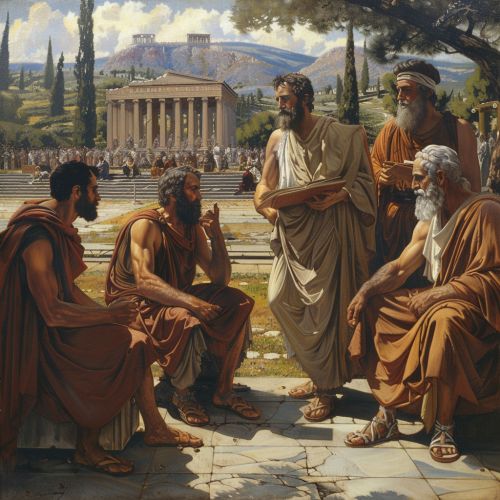Hellenistic Philosophy
Introduction
Hellenistic philosophy is the period of Western philosophy that was developed in the Hellenistic period following Aristotle and ending with the beginning of Neoplatonism. It is a rich and diverse period in the history of philosophy, marked by the spread of Greek culture and the emergence of several schools of thought, including Stoicism, Epicureanism, Skepticism, and Neoplatonism.


Historical Context
The Hellenistic period began in 323 BC with the death of Alexander the Great and ended in 31 BC with the conquest of the last Hellenistic kingdom by Rome. This era was characterized by significant cultural and political changes, which had a profound impact on the development of philosophy. The traditional city-state (polis) was replaced by cosmopolitan kingdoms, and Greek culture spread throughout the Mediterranean and Near East.
Major Schools of Hellenistic Philosophy
Stoicism
Stoicism was founded by Zeno of Citium in the early 3rd century BC. Stoics believed that the key to a good, happy life was the cultivation of an excellent mental state, achieved by using one's rational faculties to understand the universe and one's place within it.
Epicureanism
Epicureanism was founded by Epicurus in the late 4th century BC. Epicureans sought to attain a state of tranquility (ataraxia) and freedom from fear, as well as absence of bodily pain (aponia). They believed that pleasure was the greatest good, but that not all pleasures should be pursued to lead a satisfying life.
Skepticism
Skepticism in the Hellenistic period is most often associated with Pyrrho and the school of thought known as Pyrrhonism. Skeptics argued that certainty was impossible and that one should suspend judgment.
Neoplatonism
Neoplatonism is a later development, but it has its roots in the Hellenistic period. It was founded by Plotinus in the 3rd century AD, and it synthesizes Plato's philosophy with Hellenistic philosophy and Eastern religions.
Conclusion
Hellenistic philosophy represents a pivotal period in the history of Western thought, bridging the gap between the classical philosophy of Plato and Aristotle and the later developments of Roman and Medieval philosophy. Its influence can be seen in many subsequent philosophical movements and continues to be a subject of study and interest today.
